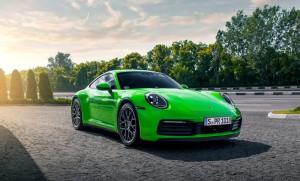« Articles
Porsche 911 Hybrid: The Future of Performance Unveiled

The Porsche 911, a name synonymous with automotive excellence, has been the cornerstone of Porsche's identity for nearly six decades. This legendary sports car, known for its distinctive design and unparalleled performance, has undergone numerous evolutions since its inception.
Each iteration has brought with it advancements in technology and design, solidifying the 911's status as a benchmark in the sports car segment. Now, as we approach a new era in automotive engineering, Porsche is poised to introduce one of the most significant changes in the 911's storied history: the integration of hybrid technology.
The Dawn of a New Era: Hybrid Porsche 911
Slated for a grand debut around 2025, the hybrid Porsche 911 marks a pivotal shift in the model's trajectory. This launch is expected to coincide with the introduction of the refreshed 992.2 generation, a move that represents a harmonious blend of tradition and innovation. The anticipation surrounding this release is not just about a new model but a testament to Porsche's commitment to embracing sustainable technologies while maintaining the high-performance standards that the 911 is known for.
Design and Technical Mastery

A Leap into Hybridization
In a departure from the trend of plug-in hybrids, the Porsche 911 Hybrid will feature a non-plug-in hybrid system. This strategic choice underscores Porsche's dedication to balancing environmental considerations with the dynamic driving experience that is quintessential to the 911.
Powertrain and Performance
At the heart of the Porsche 911 Hybrid lies a sophisticated powertrain, combining a 2.0-liter kWh battery pack and a 400-volt architecture. This system is complemented by an electric motor capable of delivering 8090 horsepower. However, the true essence of the 911's performance is preserved through the integration of a twin-turbo 3.0-liter flat-six engine, a nod to the model's rich heritage.
This synergy between electric and combustion engines is expected to produce a total system output of around 475 horsepower. This figure not only promises exceptional performance but also signifies a new chapter in the 911's legacy, where power and efficiency coexist seamlessly. Building on this success, Porsche's turbo models are anticipated to push the boundaries even further, offering an exhilarating blend of turbocharged power and advanced hybrid capabilities.
The introduction of the hybrid Porsche 911 is more than just an update; it's a bold statement about the future of high-performance vehicles. By harmoniously blending traditional combustion engines with cutting-edge electric technology, Porsche is setting a new standard in the sports car domain. This move not only respects the 911's illustrious past but also paves the way for a more sustainable and exhilarating future in automotive engineering.
Release and Availability: The Wait for the Hybrid 911
While Porsche has yet to make an official announcement regarding the release of the hybrid 911, the automotive world is rife with speculation. Industry experts and enthusiasts alike are eyeing 2025 as a potential launch year, aligning with what could be a momentous occasion: the 60th anniversary of the Porsche 911. This timing would not only be symbolic but also a fitting tribute to the enduring legacy of this iconic model.
Staggered Release: A Strategy for Diverse Offerings
Porsche is known for its staggered release strategy, particularly when it comes to new and updated models. This approach is expected to be employed with the hybrid 911 as well. The initial release may feature standard models, with more high-performance variants, such as a rumored 911 GT2 RS with around 800 horsepower, likely to follow in subsequent years. This staggered rollout allows Porsche to cater to a wide range of customers, from those seeking the classic 911 experience to those craving the utmost in power and performance. Following this strategy, Porsche's Electric Macan Revolution is set to further showcase the brand's commitment to electrification, merging innovative technology with dynamic performance.
Testing and Development: Glimpses of the Future
On the Track: Prototypes in Action
Porsche's commitment to perfection is evident in its rigorous testing regime. Prototypes of the hybrid 911 have been spotted undergoing extensive testing at the Nrburgring, one of the most challenging race tracks in the world. These tests are crucial for fine-tuning the car's performance, handling, and reliability, ensuring that the final product lives up to Porsche's high standards.
The Nrburgring: A Testing Ground for Innovation
The Nrburgring's demanding conditions provide the perfect backdrop for Porsche to push the limits of its hybrid technology. Observations from these tests suggest that Porsche is not only focusing on power and speed but also on how the integration of electric and combustion engines can enhance the overall driving experience.
The Porsche 911 Hybrid's Place in Automotive History
The introduction of the Porsche 911 Hybrid is set to be a landmark event in the automotive world. This model represents a bold step forward, blending the 911's rich heritage with cutting-edge hybrid technology. It signifies a commitment to sustainability without compromising on the performance that has defined the Porsche brand for generations.
You may also like: Mercedes-AMG SL 63 S E vs. Porsche 911 Turbo S Cabriolet
Looking Ahead: The Future of Performance Vehicles
The development of the hybrid 911 is more than just an evolution of a single model; it's a glimpse into the future of performance vehicles. As environmental concerns become increasingly paramount, the automotive industry is being challenged to find new ways to deliver exhilarating performance in more sustainable ways.
Porsche's foray into hybrid technology with its most iconic model is a testament to the brand's vision and adaptability, setting a precedent for others to follow. The Porsche 911 Hybrid is not just a new car; it's a beacon for the future of high-performance, environmentally conscious driving.
This content was created by AI
Featured Video
The fastest Porsche 911 ever made | Turbo S
The Porsche 911 has a turbo boost button but you only have 20 seconds...

Comment using Facebook